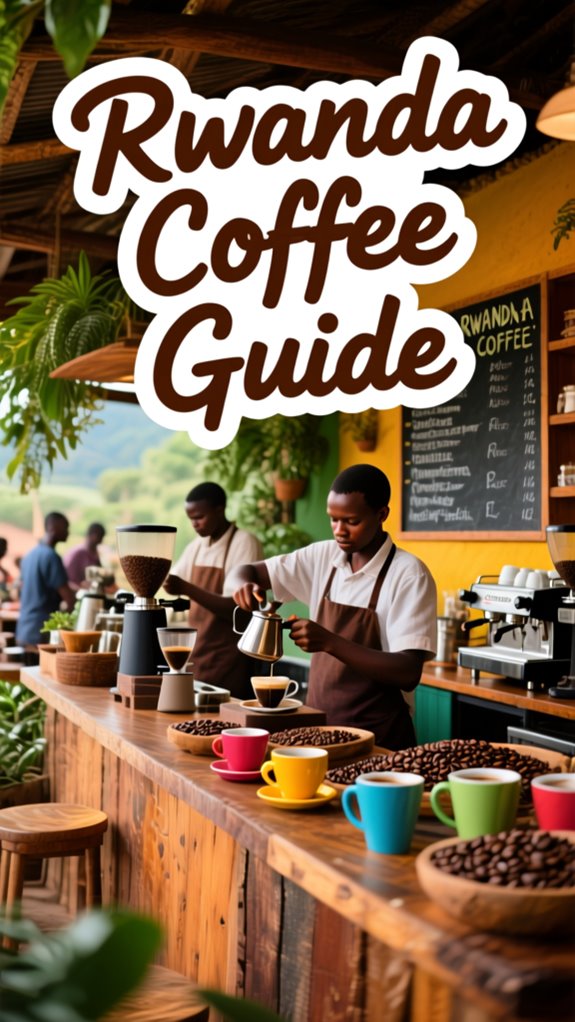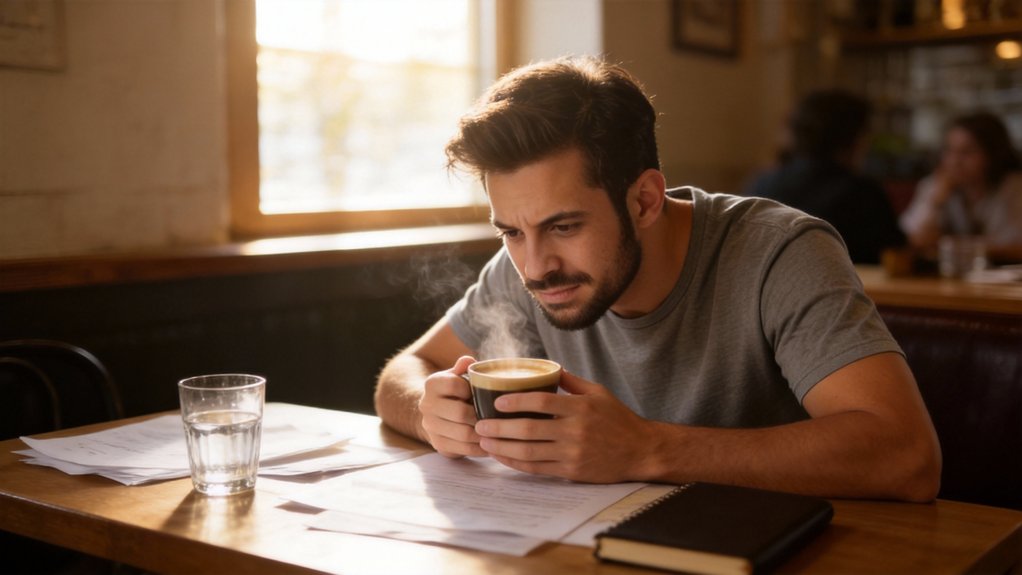Ever wondered why Rwandan coffee has captured the attention of specialty coffee enthusiasts worldwide? If you’ve been searching for beans that offer complexity, brightness, and a truly distinctive cup, Rwanda’s high-altitude Bourbon Arabica might be exactly what’s missing from your coffee routine.
In this guide, you’ll discover what makes Rwandan coffee so special-from its vibrant flavor notes of citrus and red fruits to the volcanic soils and ideal growing conditions that shape its character. We’ll also explore the country’s remarkable coffee industry transformation, walk through the best brewing methods to highlight these unique beans, and share tips for sourcing authentic Rwandan coffee that lives up to its reputation.
Table of Contents
What Makes Rwanda Coffee So Special Today

Rwanda coffee stands out today as a remarkable testament to resilience, quality, and agricultural innovation.
Grown at high altitudes in volcanic soil, Rwandan Arabica-primarily Bourbon variety-delivers exceptional flavor profiles that coffee enthusiasts crave.
What sets this coffee apart is its meticulous production process: farmers hand-pick ripe cherries and implement rigorous sorting techniques that ensure top-tier quality.
With a global reputation for excellence, Rwanda’s coffee isn’t just a beverage; it’s a story of recovery and economic empowerment. Economic transformation has helped nearly 400,000 smallholder farmers build sustainable livelihoods through coffee production.
Each cup represents centuries of agricultural tradition and a nation’s remarkable journey of transformation.
The Unique Taste Profile of Rwandan Beans

When you first sip a cup of Rwandan coffee, you’ll discover a sensory journey that sets these beans apart in the world of specialty coffee.
Bright citrus notes like lemon and orange dance with tropical fruit flavors, creating a vibrant, complex profile.
The coffee’s signature silky texture carries a creamy, almost buttery mouthfeel, complemented by delicate floral undertones of orange blossom and rose.
High-altitude growing conditions and volcanic soils contribute to its distinctive sweetness, with hints of caramel and spice.
Each sip reveals layers of flavor that make Rwandan coffee truly extraordinary. Bourbon variety’s rich flavors emerge from the unique terroir of Rwanda’s mountainous coffee-growing regions.
Where Does Rwanda Grow Its Best Coffee
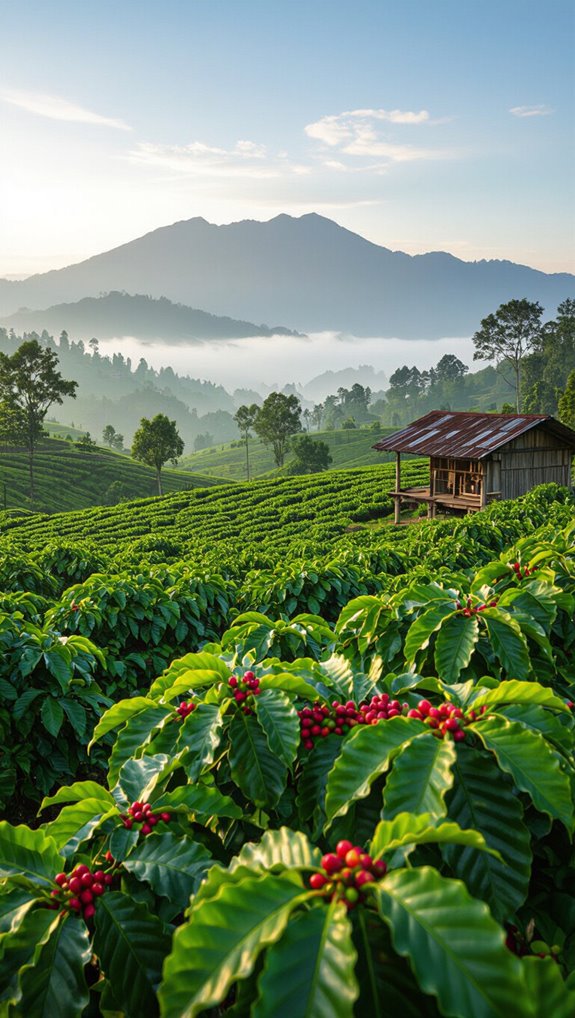
Nestled within the heart of East Africa, Rwanda’s coffee-growing regions offer some of the most extraordinary terroir for specialty coffee cultivation.
From the high-altitude Southern Province to the volcanic soils of the Kizi Rift Valley, each region produces unique flavor profiles that’ll make your taste buds dance.
The Southern Province’s Huye and Nyamagabe areas boast syrupy, chocolatey coffees, while Western Province’s Lake Kivu region delivers fruity, jasmine-infused beans.
Northern Province’s Gakenke district impresses with bright, crisp coffees reminiscent of Ethiopian Yirgacheffe, showcasing Rwanda’s incredible coffee diversity. Smallholder farmers drive this remarkable coffee landscape, with over 400,000 agricultural workers supporting the nation’s specialty coffee transformation.
Rwanda Coffee History After the 1994 Genocide
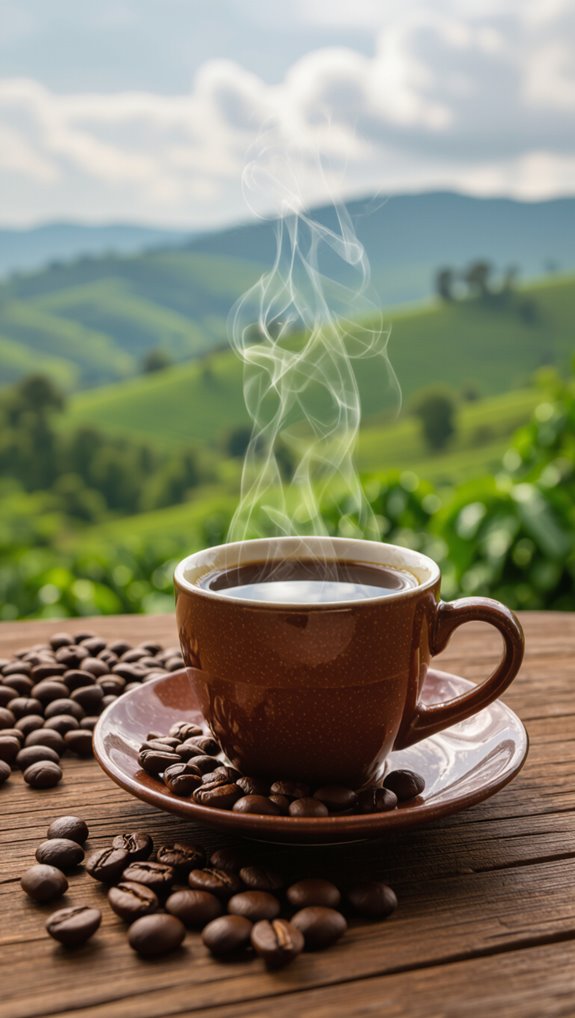
After the devastating 1994 genocide, Rwanda’s coffee industry lay in ruins, with communities, farms, and entire economic infrastructures shattered beyond recognition.
International aid and strategic government intervention became crucial for revival. USAID’s PEARL and SPREAD programs provided critical technical assistance, helping farmers rebuild central washing stations that dramatically improved coffee quality.
How to Brew Rwanda Coffee at Home
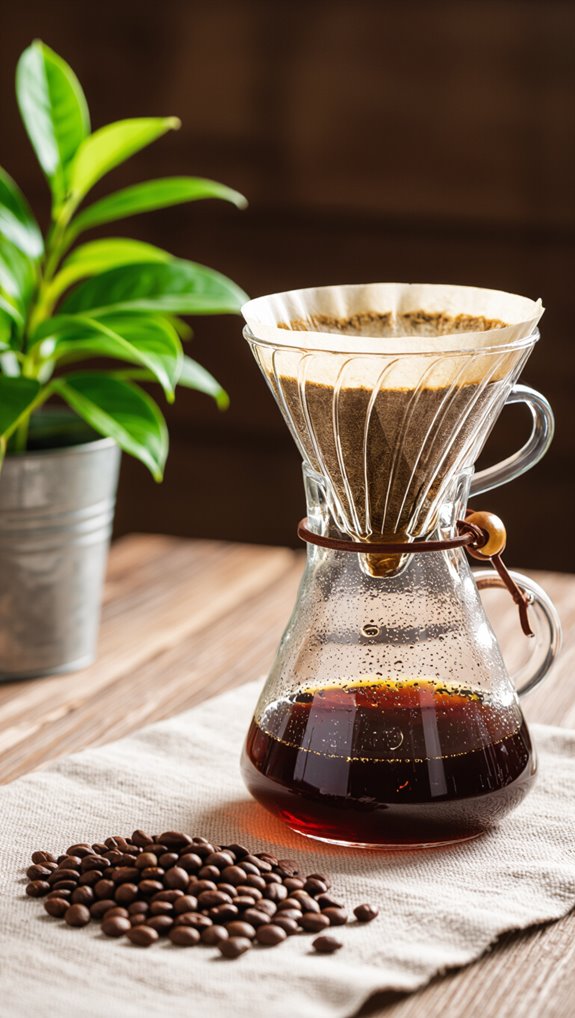
To brew exceptional Rwandan coffee at home, you’ll need specific equipment like a gooseneck kettle, a precision scale, and your preferred brewing method (V60, Chemex, or espresso machine).
I recommend starting with high-quality, freshly roasted Rwandan beans and focusing on precise grinding, water temperature, and extraction techniques to unlock the coffee’s unique flavor profile.
Your brewing journey will explore methods that highlight Rwandan coffee’s distinctive tart red fruit, honey, and spice notes through careful preparation and attention to extraction details.
Equipment
Brewing exceptional Rwandan coffee at home requires grasping the right equipment and techniques that can unlock the beans’ distinctive flavors. Different brewing methods can highlight unique characteristics, from the full-bodied French press to the clarity-driven pour-over.
| Brewing Method | Best for Rwanda Coffee |
|---|---|
| French Press | Full body & acidity |
| Pour-over | Floral notes & clarity |
| Espresso | Intense flavor profile |
| Vacuum Brewer | Complex flavor extraction |
| Single-serve | Convenient brewing |
Mastering grind consistency, water temperature, and extraction time transforms good coffee into an extraordinary sensory experience. Experiment with techniques to discover your perfect Rwanda coffee brew.
Ingredients
Now that you’ve selected your brewing equipment, let’s gather the right ingredients to craft an exceptional cup of Rwandan coffee.
Start with high-quality Arabica beans from regions like Virunga or Kivu, known for their floral and fruity profiles. Use filtered water heated to 96°C and aim for a coffee-to-water ratio of 1:16.
Choose a medium-coarse grind perfect for pour-over methods.
For the best flavor, select beans processed using wet methods and roasted light to medium to preserve those delicate notes of rose, raspberry, and honey that make Rwandan coffee truly special.
Instructions
If you’re eager to transform those exceptional Rwandan coffee beans into a sublime brewing experience, mastering the right technique is key to unlocking their vibrant flavor profile.
I recommend starting with a pour-over method using a V60 or Chemex. Grind your beans medium-coarse, aim for a 1:16 coffee-to-water ratio, and heat water to 94°C. Begin with a 30-second bloom, then pour in stages, targeting a total brew time of 3:40-4:00 minutes. Gentle swirling between pours ensures even extraction, highlighting Rwanda’s signature fruity and complex notes.
Best Rwanda Coffee Beans You Can Buy

Passionate coffee lovers can discover an extraordinary range of high-quality Rwanda coffee beans that promise exceptional flavor and unique regional characteristics.
Westrock Coffee Company Rwanda Select Reserve offers a medium-dark roast with earthy notes, while Rwanda Bean Coffee delivers bright acidity and floral undertones.
For socially conscious buyers, Rwanda Sholi Coffee provides Fairtrade and Organic certified whole beans supporting community development.
Huye Mountain Coffee stands out with its fruity profile, and Silverback Coffee represents another premium Rwandan option.
Each brand showcases the incredible diversity of Rwanda’s coffee landscape, highlighting Red Bourbon Arabica‘s rich, sweet flavors grown at high altitudes.
Rwanda vs Kenya Coffee: Key Flavor Differences
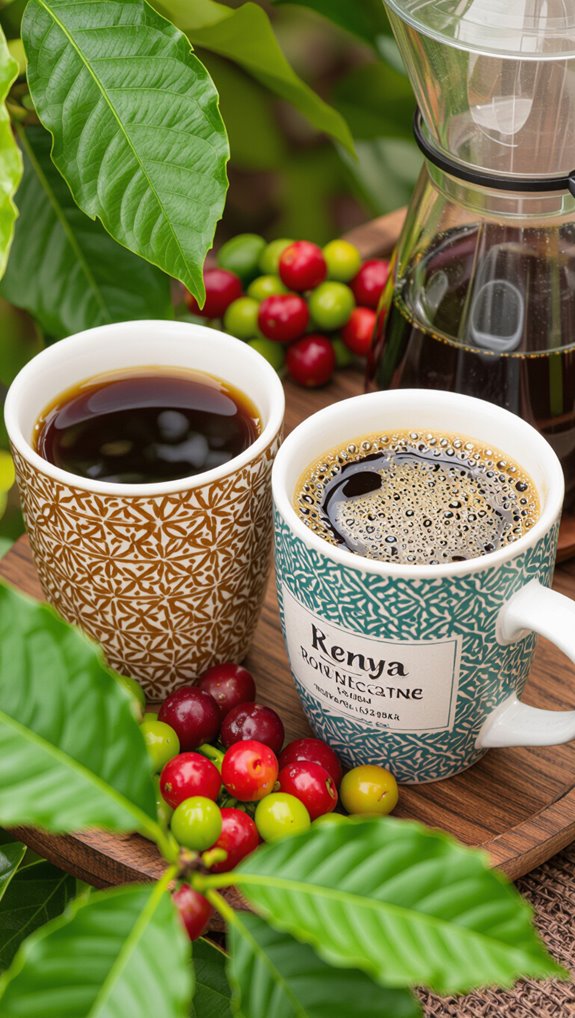
Coffee enthusiasts often wonder about the distinctive flavor profiles of Rwandan and Kenyan coffees, two African origins celebrated for their exceptional quality and unique taste characteristics.
While Kenyan coffee bursts with bold, wine-like acidity and intense fruit notes like blackcurrant, Rwandan coffee offers a smoother, more delicate experience. Kenyan beans showcase a vibrant, tangy complexity with a heavy body, whereas Rwandan coffees deliver gentler fruit flavors-think red grapes, apple, and chocolate-with a tea-like medium body.
Both origins shine through meticulous processing and high-altitude cultivation, making them prized among specialty coffee lovers.
Supporting Rwandan Farmers Through Fair Trade Coffee
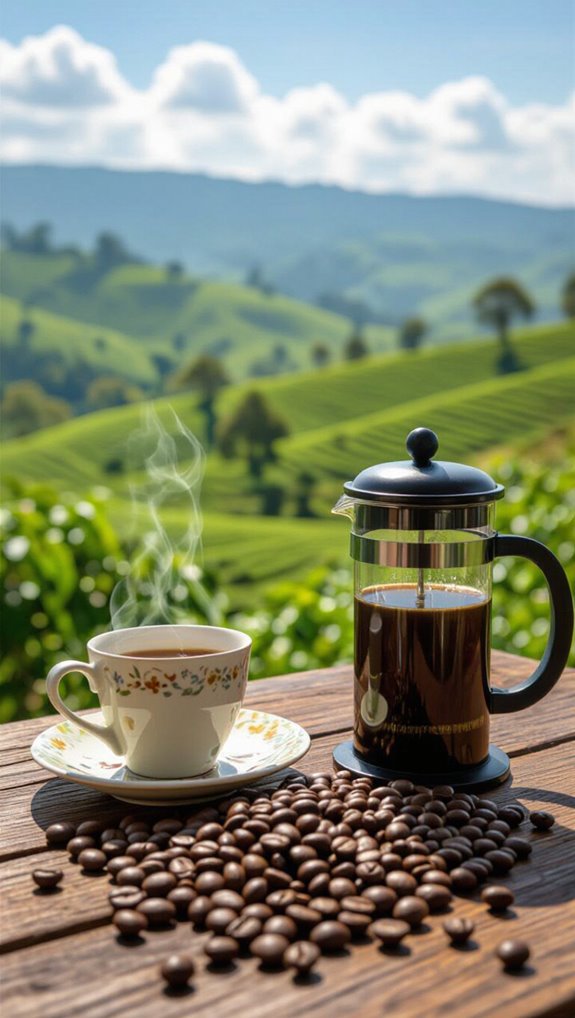
In the rugged highlands of Rwanda, fair trade coffee has become a powerful catalyst for transforming farmers’ lives, bridging economic opportunities with sustainable agricultural practices. By ensuring minimum prices and direct market access, fair trade supports over 350,000 smallholder farmers, many owning less than 0.25 hectares.
Central washing stations have been game-changers, allowing farmers to collectively process coffee cherries and improve quality. These initiatives have doubled farmer incomes and empowered women, creating pathways out of poverty.
The result? Premium Rwandan Bourbon Arabica that tells a story of resilience, community, and economic hope.
Storing Your Rwanda Coffee Beans the Right Way

Meticulously storing your Rwandan coffee beans can make the difference between a mediocre and an extraordinary cup of coffee.
Keep your precious beans in a cool, dark place-think pantry or cupboard-with temperatures between 68-77°F and humidity around 60%.
Opt for airtight, opaque ceramic or glass containers that block light and prevent oxidation.
Vacuum-sealed packaging is your friend, helping preserve those delicate flavors.
Insider tip: grind just before brewing and consume roasted beans within two weeks for maximum freshness.
Skip the fridge-it’ll only introduce unwanted moisture that’ll compromise your coffee’s incredible taste.
Frequently Asked Questions
Is Rwanda Coffee Organic and Environmentally Sustainable?
Yes, Rwanda’s coffee is increasingly organic and sustainable. I’ve learned that over 16 certified cooperatives use eco-friendly practices, avoiding synthetic chemicals and focusing on soil health, biodiversity, and supporting smallholder farmers’ environmental and economic well-being.
How Much Do Rwandan Coffee Farmers Typically Earn?
On average, I earn around 262,500 Rwf (about US$202) per coffee season. However, this barely covers my living expenses, so I’m constantly seeking ways to increase my farm’s productivity and diversify my income streams.
Can I Visit Rwandan Coffee Farms as a Tourist?
Yes, you can visit Rwandan coffee farms! I’ve found numerous tours available across Rwanda, especially near Lake Kivu and Kigali. You’ll experience cherry picking, processing demonstrations, tastings, and learn about local coffee culture firsthand.
What Roast Level Works Best for Rwanda Beans?
I recommend light to medium roasts for Rwandan beans, which beautifully showcase their unique floral, citrus, and berry notes. These roasts preserve the beans’ vibrant acidity and complexity, highlighting the distinctive flavors of different regional varieties.
Are There Any Coffee Cooperatives in Rwanda?
Yes, Rwanda has approximately 267 coffee cooperatives! I can tell you they’re crucial for smallholder farmers, helping them improve coffee quality, access markets, and empower women, with about 20% of coffee farmers being cooperative members.
In Conclusion
If you want to experience truly exceptional Rwandan coffee, the country’s beans are absolutely worth discovering. Their unique volcanic soil and high-altitude growing conditions produce incredibly complex, bright flavors that’ll transform your coffee routine. From supporting local farmers to mastering the perfect brew, exploring Rwandan coffee isn’t just about taste-it’s about connecting with a rich, resilient cultural story.
Ready to bring out the best in these remarkable beans? The right brewing equipment makes all the difference in capturing those delicate floral notes and sweet citrus undertones that make Rwandan coffee special. Check out our coffee machine reviews to find well-tested options that’ll help you unlock the full potential of these premium beans, whether you prefer pour-over precision or espresso intensity.
Your next cup could be a delicious journey of discovery, quality, and hope-one that honors both the exceptional coffee and the dedicated farmers who make it possible.


